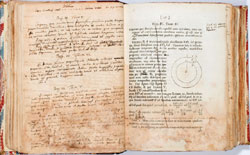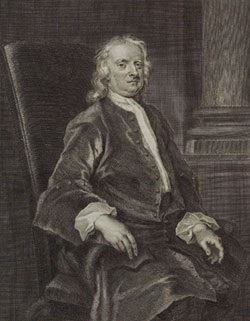The Apprenticeship of Genius
 First edition of the Principia (London, 1687) –
First edition of the Principia (London, 1687) –
Cambridge University Library, Portsmouth
Collection, Adv.b.39.1
The rusticity and provincialism of the Lincolnshire manor house where Newton
was born contrasted sharply with the cosmopolitanism and intellectual sophistication
of Cambridge University, where he arrived in June 1661. He would remain in
Cambridge for thirty-five years, and the university would contribute significantly
to the maturation of his genius.

Portrait of Isaac Newton, based on John Vanderbank's
1725 painting – Science, Industry and
Business
Library, NYPL
Newton was not the “solitary and dejected” autodidact he is commonly
perceived to have been. Nor was the university a bastion of scholasticism or
intellectual stagnation. The well-rounded and humanistically informed Cambridge
curriculum proved indispensable to Newton’s grounding in the culture
of erudition, and propitious to
the formation of his scientific methodology and distinct style of reasoning.
Cambridge also provided Newton with access to books and
like-minded colleagues – above all, his mentor, friend, and patron Isaac
Barrow. In this sense Newton truly stood “on the shoulders
of giants,” as he once wrote (albeit tongue-in-cheek) to Robert Hooke.
Much of Newton’s genius consisted of his remarkable ability to simultaneously
consume and transform any knowledge he acquired. Consequently, his celebrated
anni mirabiles (wondrous years) back
in Lincolnshire during the plague (1665–66) were not cut off from his
Cambridge experience, but were its natural extension. Samuel Johnson, therefore,
was surely
correct to conclude that Newton stood alone “merely because he had
left the
rest of mankind behind him, not because he deviated from the beaten track.”


